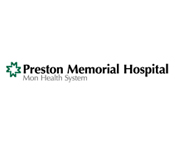 In 2012, Preston Memorial Hospital, a Critical Access Hospital, had a 30-day readmission rate for heart failure patients, which exceeded 22.6%, while the AHA HEN heart failure readmission rate was 18%. In interviewing patients, we determined that health care literacy was an issue for our heart failure patients. Patients were not able to determine for themselves when they may be gaining so much fluid weight that they needed to be diuresed. Issues included lack of scales for weight monitoring, lack of ability to see or read the scales, and lack of ability to recognize weight gain from monitoring serial weights. This resulted in potentially preventable readmissions.
In 2012, Preston Memorial Hospital, a Critical Access Hospital, had a 30-day readmission rate for heart failure patients, which exceeded 22.6%, while the AHA HEN heart failure readmission rate was 18%. In interviewing patients, we determined that health care literacy was an issue for our heart failure patients. Patients were not able to determine for themselves when they may be gaining so much fluid weight that they needed to be diuresed. Issues included lack of scales for weight monitoring, lack of ability to see or read the scales, and lack of ability to recognize weight gain from monitoring serial weights. This resulted in potentially preventable readmissions.
The team developed the Sunday Shoes Program, a method to monitor pedal edema as a marker for worsening condition, triggering a call to the physician’s office for early intervention prior to readmission. Readmissions dropped to 0% over 2013 and 2014.
Nomination Narrative
In 2012, the hospital offered discharge teaching with “teach back”, follow up appointments made before discharge, electronic medication reconciliation, and detailed written discharge instructions.
Despite teaching heart failure patients about activity level, diet, discharge medications , follow-up appointments, and weight monitoring, some patients still presented with large, unrecognized weight gain and distress. Patients were told to weigh themselves daily, but we recognized health care illiteracy in which patients could not see the scale, did not own a scale, or could not interpret change in weight (poor math skills, or cognitive decline). The hospital formed a team consisting of the Director of Quality Improvement, the Chief Nursing Officer, the Acute Care Manager, and the nursing staff on the Acute Care unit.
INNOVATION, SYSTEM CHANGE
The team decided to use structured, formal shoes (“Sunday Shoes” such as wing tips or patent leather dress shoes) to assess pedal edema in the home environment as either an adjunct or substitution to daily weights, depending on the patient’s capability. Patients were instructed to try the fit of the shoes on the day of discharge when they would be at their best dry weight, then daily in the morning to assess for change.
COLLABORATION, COMMUNICATION
The team did not want Physicians receiving puzzling calls in the office – “My shoes don’t fit.” The project was reviewed with local physicians over a two month period. The same information was given to the physician’s office staff handling the phones so they would understand when patients called to say, “My Sunday shoes don’t fit.” The local home health agency was also provided with the information to be able to assist patients with their assessment, if they were followed by home health.
TRANSFORMATION
Here is the information provided to patients in the Sunday Shoes Program for Heart Failure:
Your doctor has said that you have heart failure. Patients with heart failure may come back to the hospital again and again. If you follow your discharge instructions, you may be able to stay home longer.
One reason people come back to the hospital is too much water weight. Gaining water weight puts a strain on your heart. If you see yourself gaining water weight, you need to call your doctor for treatment.
If you do not have a scale to weigh yourself, you can join the “Sunday Shoes” program.
When you go home, find your best Sunday shoes. Put them on. See how they fit. If you gain water weight, your feet and legs swell. Your Sunday shoes will not fit as well.
Put these shoes on every morning. If your Sunday shoes do not fit like when you first got home, call your doctor. Tell your doctor you have gained too much water weight. Ask to be seen immediately.
Results
Patients actively engage in monitoring their own heart failure condition using the Sunday Shoes Program, presenting themselves for early intervention in outpatient settings.
Physicians’ offices report engagement in treating heart failure patients on an outpatient basis, preventing needless readmissions for patients who are often at end of life, allowing improved quality of life and allowing the patient to stay in his/her own home with friends and family around them.
The heart failure readmission rate was 22.5% during the baseline period of 2011 and 2012.
The heart failure readmission rate was 0% during 2013 and 2014.
The hospital achieved an estimated savings of over $113,307during this period.




